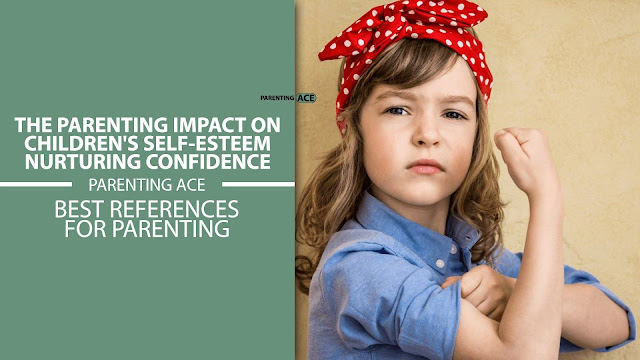The Impact of Parenting on Self-Esteem: Nurturing Confidence in Children
In the intricate tapestry of child development, few threads are as influential as the delicate weave of self-esteem. As parents, our words, actions, and attitudes form the loom upon which our children's sense of self-worth is crafted. In this blog post, we embark on a journey into the profound impact of parenting on self-esteem. From exploring the nuances of different parenting styles to unveiling effective strategies for nurturing confidence in our children, join us as we delve into the essential role parents play in fostering a strong and resilient sense of self-worth in the next generation.
 |
| The Parenting Impact on Children's Self-Esteem: Nurturing Confidence |
Self-esteem, the fundamental belief in one's own worth and abilities, plays a pivotal role in shaping an individual's overall well-being and success in life. While self-esteem is influenced by various factors, perhaps none is as profound as the impact of parenting. In this article, we delve into the intricate relationship between parenting practices and the development of self-esteem in children, exploring how different parenting styles, strategies, and behaviors can either nurture or hinder a child's confidence and sense of self-worth.
Understanding Self-Esteem
Self-esteem encompasses a child's perception of their value, competence, and worthiness. It is cultivated through experiences, interactions, and feedback received from parents, peers, and other significant individuals in a child's life. Children with healthy self-esteem exhibit confidence, resilience, and a positive outlook on themselves and the world around them, while those with low self-esteem may struggle with feelings of inadequacy, self-doubt, and worthlessness.
The Role of Parenting Styles
Parenting styles, characterized by varying levels of warmth, responsiveness, and control, significantly influence the development of self-esteem in children. Authoritative parenting, which combines high levels of warmth with clear expectations and consistent discipline, fosters a supportive environment where children feel valued and capable, thus promoting healthy self-esteem. In contrast, authoritarian parenting, marked by strict rules and little warmth, may lead to a child feeling insecure and powerless, potentially eroding their self-esteem over time.
Effective Parenting Strategies for Building Self-Esteem
Parents play a crucial role in nurturing their child's self-esteem through their words, actions, and attitudes. Positive reinforcement, encouragement, and praise for effort rather than solely outcomes can bolster a child's confidence and self-belief. Effective communication, active listening, and empathy also create a safe space for children to express themselves and develop a positive self-image. Additionally, setting realistic expectations, providing opportunities for autonomy and decision-making, and modeling healthy self-esteem behaviors can empower children to develop a strong sense of self-worth.
Challenges and Pitfalls
Despite their best intentions, parents may unintentionally undermine their child's self-esteem through overly critical or controlling behaviors, unrealistic expectations, or neglect. Moreover, external factors such as societal pressures, peer influences, and cultural norms can impact a child's self-esteem, further complicating the parenting journey. Recognizing these challenges and actively addressing them is essential in fostering a supportive environment conducive to healthy self-esteem development.
The impact of parenting on self-esteem is profound and enduring. By adopting authoritative parenting practices, employing effective strategies for building self-esteem, and remaining mindful of potential challenges, parents can empower their children to cultivate a positive sense of self-worth that will serve as a foundation for success and fulfillment throughout their lives. Ultimately, nurturing confident, resilient individuals begins with the loving guidance and support provided by parents who understand the importance of fostering healthy self-esteem in their children.




